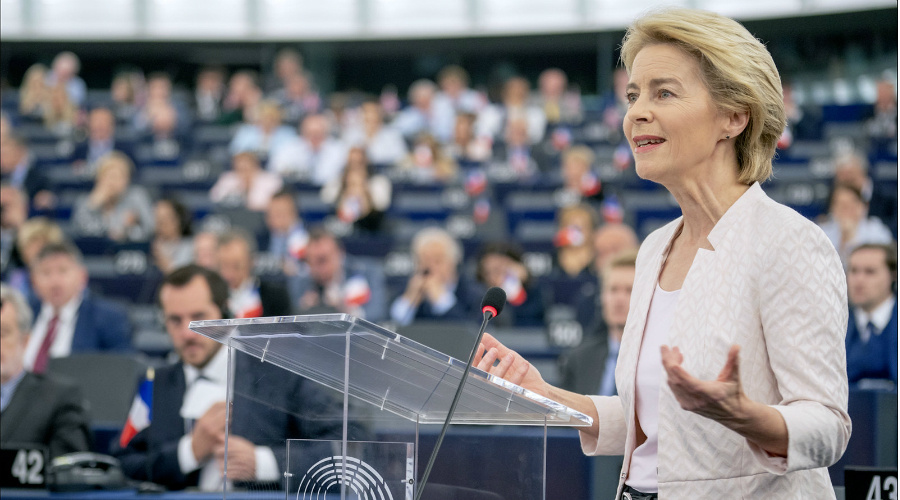Europe Needs a China Strategy; Brussels Needs to Shape It
The new president of the European Commission can help guide European policy in the right direction.

Published by The Lawfare Institute
in Cooperation With

Editor’s Note: Europe's relationship with China is fraught with disagreements and inconsistencies. Different countries have different approaches, and they are not capitalizing on the collective power of the European Union—all to China’s benefit. Julianne Smith of the German Marshall Fund and Torrey Taussig of the Harvard Kennedy School detail the problems this is causing for Europe and lay out a set of steps that would put Europe in a stronger negotiating position.
Daniel Byman
***
Europe’s momentum in developing a clear-eyed approach toward China has stalled. In March 2019, the European Commission issued a white paper naming China a systemic rival and economic competitor. That publication marked a fundamental shift in how far European institutions were willing to go in raising the challenges China poses to Europe’s openness and prosperity. It also reflected shifts that were occurring in capitals across Europe. Just as the European Union was rolling out its white paper on China, German Chancellor Angela Merkel was arguing that Europe should view China as a competitor as much as a partner, and French President Emmanuel Macron warned China that “the period of European naivety is over.”
However, since those March proclamations, neither the EU nor individual European leaders have taken the meaningful steps needed to close existing vulnerabilities in Europe’s relationship with China, stand up for European values of democracy and human rights, or strengthen Europe’s resolve against Chinese economic and political pressure. Certainly, the EU had significant distractions in the second half of 2019, as it managed a leadership transition and negotiated the Brexit arrangement, but EU leaders also had opportunities to press China on these key issues. During Merkel’s visit to China last September, she raised her concerns about Hong Kong’s pro-democracy movement but failed to bring up Chinese human rights abuses against Muslims in Xinjiang. Macron was even more reserved on human rights in his visit to China in November. He made no public mention of Chinese human rights abuses in Xinjiang, nor did he call on President Xi Jinping to respect China’s commitment to Hong Kong people’s rights.
Back home in Europe, national decisions on whether to ban Chinese tech company Huawei in Europe’s 5G telecommunications auctions on account of security concerns have been delayed and remain uncertain. Meanwhile, Greece, Portugal and Hungary have largely ignored the political leverage that comes with China’s promises of investment. Last spring, Italy became the first member of the G-7 to join China’s Belt and Road Initiative, a move criticized by Brussels, Germany and France. There is also talk among some European experts of pursuing an “equidistant” approach between the United States and China, as President Trump’s unilateral foreign policy and trade practices drive Europeans away from the transatlantic relationship.
The lack of strategy to address China’s growing role in Europe has been compounded by domestic instability within Europe. Powerful capitals including Paris, Berlin and London are mired in political turmoil or stagnation. The coming months are unlikely to produce better results. The EU will continue to face domestic and regional challenges, including ongoing protests throughout France, a weakening coalition government in Germany, and Britain’s formal exit from the union on January 31, which will trigger months—if not years—of additional work to implement.
If Europe is to regain momentum in developing a tougher China policy, it will have to come from Brussels. While recent months were consumed by a complicated and lengthy political process to confirm EU leadership, the new commission finally started in December 2019 and is off to an ambitious start.
The new president of the European Commission, Ursula von der Leyen, has called on the EU to become more “geopolitical.” She is leading an effort to revamp the EU’s competition laws to guard against unfair practices from state-owned enterprises and intends to appoint a “chief trade enforcer” for anti-dumping cases that hurt European companies. The EU’s new foreign policy chief, Josep Borrell, is also pushing for tougher member-state responses to China’s human rights abuses in Xinjiang. The EU has launched a framework for an EU-wide investment screening mechanism to address foreign (including Chinese) takeovers of European companies. Von der Leyen has also taken the lead on efforts to update and reform the World Trade Organization, which will be a central player in advancing cooperation between the United States and the EU on Chinese trade practices.
Von der Leyen’s ambitious agenda should be commended, particularly because 2020 will be a critical year for EU foreign policy as it hosts not one but two major summits with China and navigates intensifying competition between the U.S. and China. But neither von der Leyen’s plans nor the upcoming summits will be successful unless the EU does more to bridge the existing gaps across the continent when it comes to China. Europe already has several tools at its disposal to reduce vulnerabilities to Beijing’s economic leverage and political influence. Not everyone in Europe agrees, however, that China’s activities in Europe pose challenges.
Von der Leyen should therefore invest some time auditing China’s engagement in Europe, especially political influence operations. Some European countries are getting better at monitoring Chinese investments inside their own borders and many are sharpening their understanding of the complexities of the 5G debates. But individual capitals know little about China’s broader playbook in Europe. Among other policies, China is also doing its very best to keep Europe divided by pursuing regional forums like its “17+1” initiative for countries in Central and Eastern Europe. Brussels should therefore serve as a clearinghouse, enabling countries to share cautionary tales and best practices across Europe.
For example, EU members should hear from Zdenek Hrib, the mayor of Prague who recently broke sister-city ties with Beijing. How did he reach that decision, and what have been the ramifications? Brussels may also want to invite the Estonian government to share how the Chinese reacted when one of its daily papers, Postimees, published a three-part series on Chinese malign influence, intelligence gathering and soft power. Other governments could glean lessons from these stories.
In addition to auditing Chinese actions in Europe, von der Leyen and her team need to extract lessons from other democracies around the world. Taiwan, Australia and Japan have a lot to share regarding their own experiences with disinformation and foreign interference. In response to encroaching Chinese political influence, Australia passed a sweeping national security law in 2018 that banned foreign political interference and made it illegal to engage in covert activity on behalf of a foreign government, such as organizing a rally. The legislation also required foreign lobbyists to register on a public list. (In response, China canceled visas for Australian business leaders.) In Taiwan, the liberal democracy that receives the most disinformation spread by a foreign government, social media platforms are consistently flooded with disinformation from Chinese state-backed influence campaigns. This level of Chinese interference may not be on Europe’s radar yet, but China’s pressure campaign will likely move westward as its interests in Europe grow.
Just as it doesn’t have one perspective on Russia or the United States, Europe will never settle on a single view of China. But if von der Leyen manages to at least increase European awareness of Chinese activities in Europe, she could then turn to the important task of sharpening the EU’s existing toolkit. Here, there are three things she needs to do. First, she should use the Dutch decision to prevent China from acquiring one of its sensitive semiconductor equipment companies as a call to action. The Dutch government made that decision only after the White House gave the Netherlands prime minister an intelligence report on the dangers of China acquiring that firm. European governments should be able to make those assessments themselves, and European intelligence agencies should be raising similar concerns. Von der Leyen can lead policymakers toward more thorough evaluations of Chinese acquisitions.
Second, von der Leyen needs to strengthen European competition rules. Access to the single market is a major element of Europe’s geo-economic power. The EU should prioritize tougher regulation and enforcement laws to ensure that all companies, including Chinese state-owned enterprises, are playing by the same rules as European companies. Margrethe Vestager, the European commissioner for competition, is already looking into possible responses to state-owned companies outside the EU gaining an advantage over European companies. That’s a great start. The European Commission may also want to look at the Dutch proposal to add a pillar to EU competition law, allowing the EU to intervene if it finds that state-backed businesses are distorting markets and pursuing unfair practices.
Finally, von der Leyen needs to enhance European and national-level investment screening mechanisms. Chinese foreign direct investment in Europe increased 10-fold over a decade, peaking at 37.2 billion euros in 2016 (although it has tapered in recent years). In response, Brussels has been ramping up its efforts to develop an EU-wide approach. In April 2019, the EU created a new framework for foreign investment screening. It enables member states and the European Commission to exchange information and raise concerns related to foreign investments—an important first step. However, the screening framework has been watered down to accommodate internal differences and member states still have the final say.
The EU needs to strengthen this mechanism and continue to close loopholes. In doing so, it should look to the U.S. screening mechanism, the Committee on Foreign Investment in the United States (CFIUS), for both its strengths and its weaknesses. The CFIUS is well staffed and resourced. It reviews hundreds of foreign acquisitions per year and has proved capable of blocking or restricting investments that are deemed a national security threat. It also requires companies to provide notification of potential acquisitions in critical industries and does not allow them to proceed without CFIUS review. Still, the U.S. system does miss some smaller transactions and could do a better job profiling foreign investments that try to circumvent the CFIUS through real estate acquisitions or technology transfers. Such drawbacks could be corrected in the European approach.
Brussels has many of the ingredients it needs to forge a stronger and more coherent strategy on China. The new leadership appears committed to tackling these issues, and the EU’s existing toolkit is a solid foundation that simply needs to be strengthened and implemented. The one missing piece for Brussels is willing partners. If powerful EU member states step up and make important decisions on their approaches toward China, including whether to strengthen national investment screening mechanisms and work with Huawei on 5G, Brussels could make 2020 a defining moment for Europe’s China strategy.






